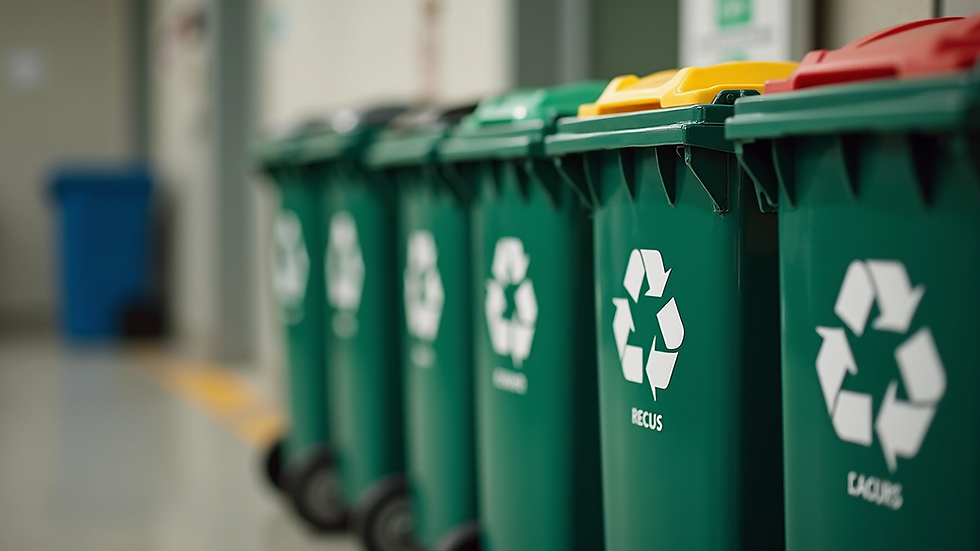How to Make Recycling a Family-Friendly Habit
- Amy

- Jun 24
- 4 min read
Recycling is essential for protecting our planet and conserving resources. Making it a family-friendly habit can be fun and rewarding. Families can work together, teaching children the importance of sustainability while contributing to a greener world. In this post, we will explore practical steps to turn recycling into an enjoyable routine for the whole family.
Understanding the Importance of Recycling
It's vital for families to understand why recycling is necessary. Did you know that recycling one ton of paper can save 17 trees? According to the Environmental Protection Agency (EPA), recycling and composting prevented the release of 186 million metric tons of carbon dioxide equivalent into the air in 2018.
When families learn about the impact of waste on the environment, they are more likely to participate in recycling efforts. Discuss how waste in landfills contributes to pollution and climate change. Use statistics and facts to show kids that their efforts make a difference.

Simple Recycling Tips
Getting started can be straightforward with these simple recycling tips. Begin by setting up a recycling station in your home. Designate a specific area, like the kitchen or garage, where family members can easily drop off recyclable items.
Label each bin clearly with images or words that indicate what materials go where, such as paper, plastic, and glass. This visual aid will help kids identify what can and cannot be recycled. Regularly empty the bins to encourage a tidy space and maintain excitement about recycling.
You can engage children in this process by making it a game. For instance, hold contests to see who can sort items into bins the fastest or develop a reward system for consistent recycling efforts.

Make it Educational and Fun
Education is key to instilling good habits. Teach children about the recycling process, starting from collection to manufacturing new products. Use documentaries, online resources, or books to explain concepts in a kid-friendly manner.
Consider visiting a local recycling facility as a family. Seeing firsthand how recycling works can create a lasting impression. Some facilities offer educational tours for families, showing how their efforts can change waste into valuable resources.
Games can also reinforce lessons. Create quizzes or scavenger hunts focusing on everyday items and their recyclable potential. Using creative approaches keeps kids engaged and makes learning exciting.
Incorporate Recycling into Family Activities
Recycling doesn't have to be a chore. Incorporate it into family activities to make it more enjoyable. For example, plan a DIY project using recycled materials. Transform empty soda bottles into plant pots or turn old magazines into collages.
These activities can teach children about reusing materials while fostering creativity. While making art, discuss how many items can be repurposed, reducing waste and promoting sustainability in daily life.
Encourage kids to keep their eco-friendly activities consistent. Start a monthly family clean-up at a local park, emphasizing collecting recyclables and noting the difference your family is making.
Set a Positive Example
Children learn by observing their parents. Set a positive example by practicing what you preach. Make recycling as ingrained in your family’s lifestyle as brushing teeth or eating dinner together.
When shopping, choose eco-friendly products or ones with minimal packaging. Always ask your children to join you in these decisions and explain the reasoning behind them. Inviting them to participate demonstrates that every action counts, no matter how small.
As a family, create a pledge to reduce waste and recycle more. Write it down and hang it somewhere visible. This not only serves as a reminder but also builds a support system where everyone helps each other stick to commitments.
Celebrate Success and Progress
Recognizing achievements, both big and small, helps reinforce positive habits. Celebrate your family’s milestones, such as reaching a certain number of items recycled or completing a challenging project based on recycled goods. Host a recycling contest, and reward the winning family member with a fun Eco-friendly prize of their choice.
Document progress by keeping a recycling journal. Kids can record how many items they've recycled each month and any activities they've participated in. As they see the impact of their actions, they'll be motivated to continue.
Creating a shared experience fosters teamwork within the family. When everyone is proud of their contributions to recycling efforts, it reinforces the significance of the initiative. The excitement can even spread to friends and neighbours, inspiring them to join in.
The Road Ahead: Sustaining the Habit
Making recycling a family-friendly habit is not a one-time event; it’s an ongoing commitment. Continue to educate your family about environmental changes and stay updated about best practices. Engage with local community initiatives that promote recycling, and consider joining such programs together.
Support and share your recycling journey with other families in your community. This builds a spirit of collaboration and reinforces the importance of looking out for the well-being of the planet. Everyone can learn new recycling tips and share experiences.
Remember that every effort counts. Implementing these strategies will create lasting habits that benefit not just your family, but the Earth as a whole.
Overall, recycling is not just about reducing waste; it's about creating a culture of responsibility and stewardship. Encouraging families to make recycling enjoyable nurtures bonds and fosters a generation that cares for the planet.
Whether through educational games, crafting, or community service, creating a family-friendly recycling routine can lead to meaningful habits that last a lifetime.












Comments